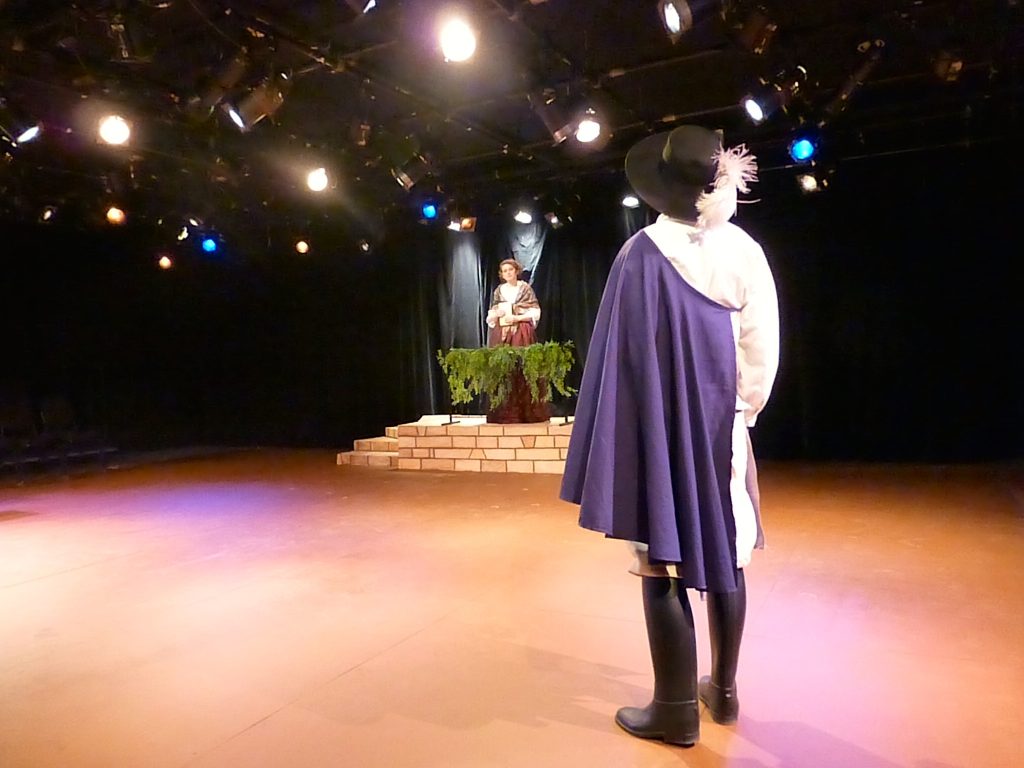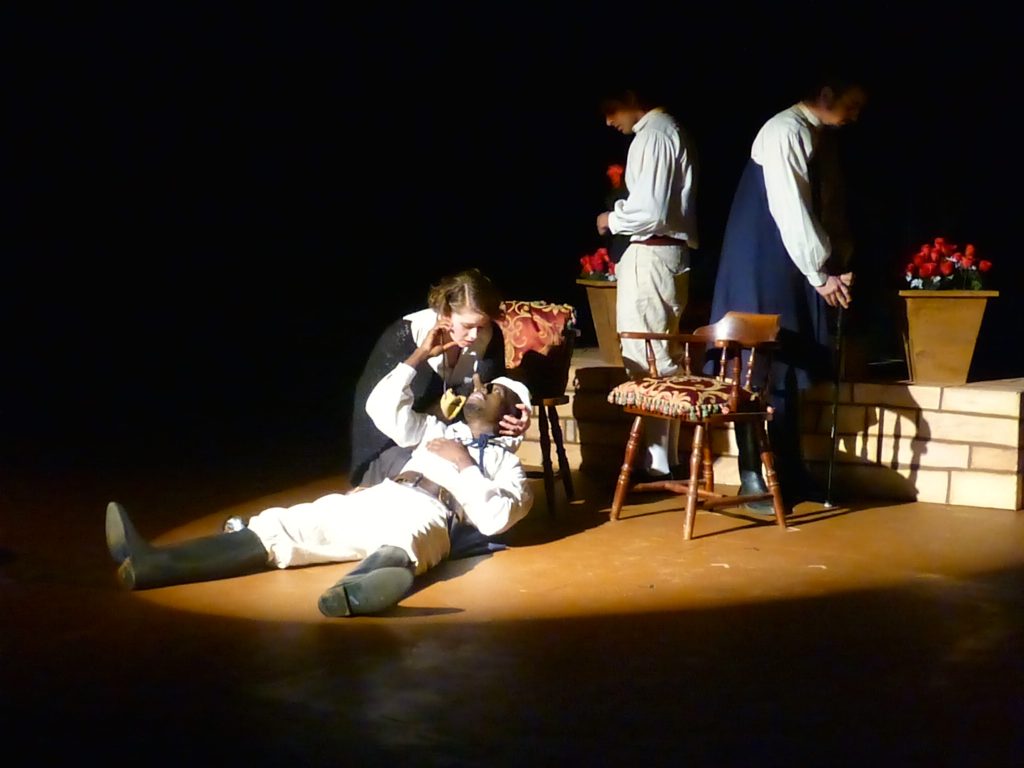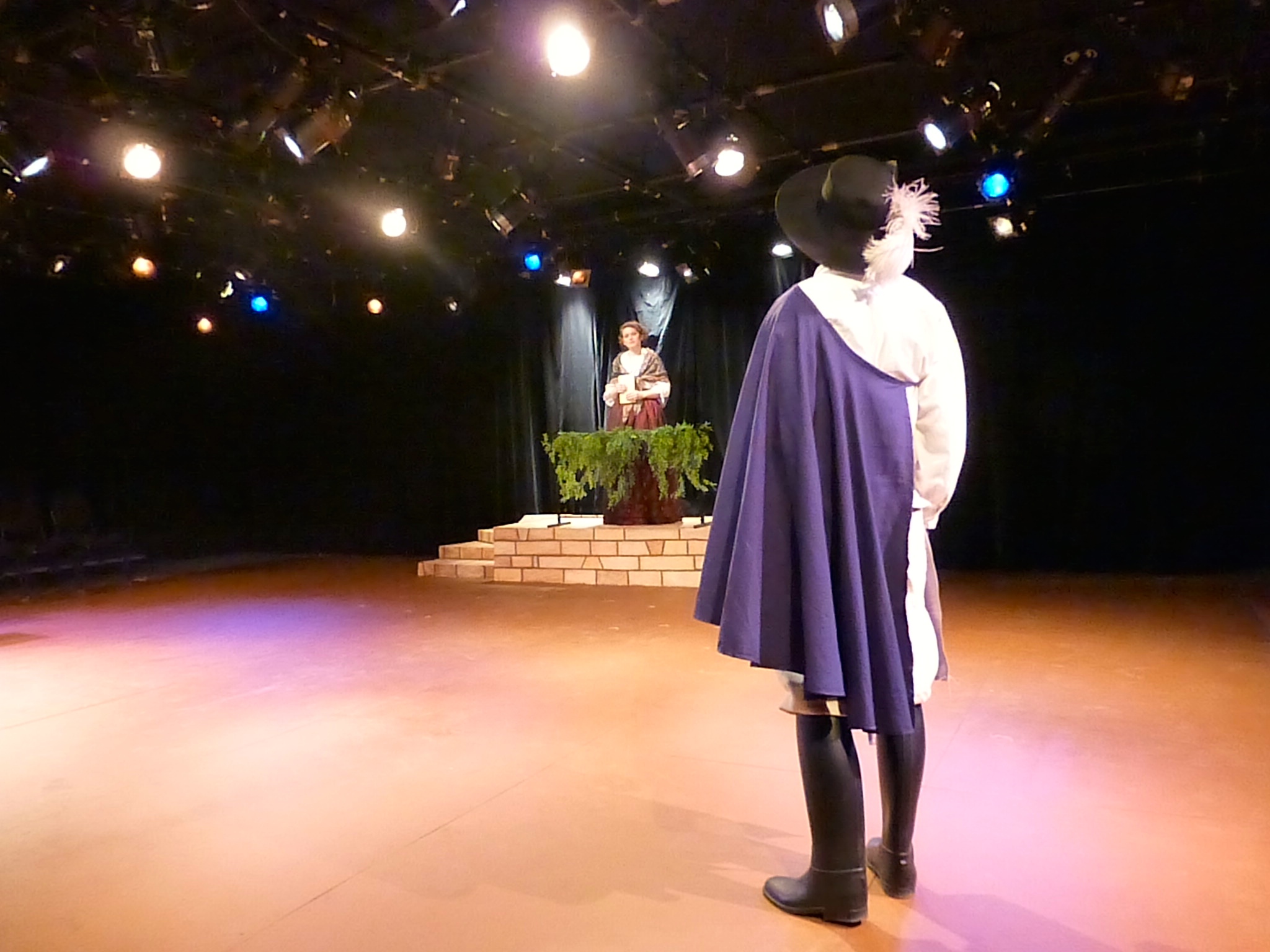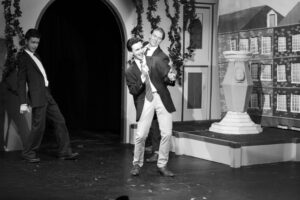A few dirty jokes, poetry, sword fights, and a bit of panache sum up Mask and Bauble’s most recent production, Cyrano. The show, created by Michael Hollinger and Aaron Posner, is a modern reinvention of Edmond Rostand’s comedic tragedy, Cyrano de Bergerac,. The two locals have collectively made their way around the capitol, working with the Folger Shakespeare Theatre and other thespian-loving venues. The play’s interesting new spin found its way to Mask and Bauble through Nicholas Norberg (COL ’16), a senior making his directorial debut on campus. Norberg has met both Hollinger and Posner, and the production, being performed at Poulton Hall Feb. 19-21 and 24-27, certainly does their work justice.  The show moves from the streets of Paris to a Spanish warfront beautifully, all while remaining within the confines of the traditional Blackbox Theater. With only one set piece and a few pieces of furniture, the cast uses effective lighting and blocking to maximize the space and set an appropriate mood, whether that be in comedic whimsy or the final, tragic death scene.
The show moves from the streets of Paris to a Spanish warfront beautifully, all while remaining within the confines of the traditional Blackbox Theater. With only one set piece and a few pieces of furniture, the cast uses effective lighting and blocking to maximize the space and set an appropriate mood, whether that be in comedic whimsy or the final, tragic death scene.
Novelty and youthfulness particularly stand out in Mask and Bauble’s production. According to producer Annie Ludtke (MSB ’18), “We have four actors who have never done theater at Georgetown before, and one who has never done theater before.” The risk of having new actors pays off, specifically in Sami Rahman (NHS ’16), who had never acted before starring in this production. Rahman’s keen awareness of his own comedic voice, notably in the bakery scene of the first act, made for several laugh-out-loud moments.
Physical youth was an exciting component of this production for Norberg, working with a young cast, “doing things that blatantly no character of that age would be able to do, things can be very funny,” Norberg stated. He was specifically referring to the accentuated physical comedy of the production as well as the sheer humor of youths taking on roles generally played by older actors. Although the show is quite funny, this youthful quality has its faults as well. The portrayal of Ligniere, the drunken friend of de Bergerac, was unsatisfying. Jokes were told with over-enthusiastic camp that took away the subtleties of humor. The young actor, portraying intoxication and later making one of the most overtly sexual jokes of the play, while portraying a different character, was done with simply too much excitement. To the credit of this actor and others struggling in certain roles, most of the cast plays two or three parts, some succeeding as comedic characters while others shine in more intense parts.
 The novelty of a modern adapted script was a pleasant surprise, excelling where many revamping projects fail. The show does not deviate from the original plot, following the clever yet deformed Cyrano de Bergerac (Greg Ongao SFS ’16) in his painful desire for his cousin Roxanne (Taylor Rasmussen COL ’16), or “Second! cousin” as the new script comically corrects. Her love for the handsome, youthful Christian (Jonathan Marrow COL ’18) leads to a tragic story of unrequited love realized too late. Rostand’s original work was written entirely in poetic verse; the most intense change of the show is in the script itself. Poetic beauty is not sacrificed in these revisions, however. Onago, the titular hero and the show’s main poetic orator, has a commanding presence on the stage, able to be charmingly comedic or strong and stern depending on the scene. Another poetic notable is Benjamin Lillian (COL ’18), playing Le Bret. Marrow does an adequate job in the seriousness of Christian’s character, seeming to thoroughly understand the humility and boldness of the role. His meek tone at times allows for a pleasant distinction in age between Cyrano and Christian, despite the actors being nearly the same age.
The novelty of a modern adapted script was a pleasant surprise, excelling where many revamping projects fail. The show does not deviate from the original plot, following the clever yet deformed Cyrano de Bergerac (Greg Ongao SFS ’16) in his painful desire for his cousin Roxanne (Taylor Rasmussen COL ’16), or “Second! cousin” as the new script comically corrects. Her love for the handsome, youthful Christian (Jonathan Marrow COL ’18) leads to a tragic story of unrequited love realized too late. Rostand’s original work was written entirely in poetic verse; the most intense change of the show is in the script itself. Poetic beauty is not sacrificed in these revisions, however. Onago, the titular hero and the show’s main poetic orator, has a commanding presence on the stage, able to be charmingly comedic or strong and stern depending on the scene. Another poetic notable is Benjamin Lillian (COL ’18), playing Le Bret. Marrow does an adequate job in the seriousness of Christian’s character, seeming to thoroughly understand the humility and boldness of the role. His meek tone at times allows for a pleasant distinction in age between Cyrano and Christian, despite the actors being nearly the same age.
Overall, the cast and crew have created a new take on an already interesting play. Neo-romantic theater blends into tongue-in-cheek phallic humor and tearful moments of poetic beauty. Actors and crew alike make so much out of an empty space. By the end, you will leave smiling, trying to think of your own poetry or silently humming the song of the Gascony Guards.





